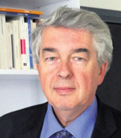Save the date 20-22 April 2018

Speaker Details
|
|
|
|
Biography |
|
|
 Pascal Griset was born in 1957. He is Professor of History in Sorbonne Université since 1998 and researcher at Sirice Institute. He is the coordinator of the H 2020 project "InsSCiDe" (Inventing a Shared Science Diplomacy for Europe). He is at the head of the Institute of Communication Sciences. Trained as a business historian, his research focusses on innovation, research policies and research organisations in France and Europe. Former Fulbright Visiting Fellow and auditor of the Institute for Industrial Strategy, he is currently president of the Scientific Committee for the history of INSERM (Institut national de la santé et de la recherche médicale), vice president of the Association for the History of Computing and Telecommunications, a member of the Committee for the economic and financial history of France, of the Scientific Committee for Historical Defense Research and the Scientific Council of the Committee for the History of La Poste. The first chairman of CNRS National Committee’s Section 42 (Interdiciplinary research on communication), Pascal Griset was a founding member of the steering committee of the Tensions of Europe international academic network. As such he participated in the ESF-Eurocores programme “Inventing Europe” (2008-2012) definition. He also was a member of the NIAS theme group “The Making of Europe”, which prepared a 6 volume European history of technology (1850-2000), J. Schot and P. Scranton eds; Palgrave, 2015-2017. He is the author of one of these volumes with Pr. Dr. Andreas Fickers (forthcoming).
Pascal Griset was born in 1957. He is Professor of History in Sorbonne Université since 1998 and researcher at Sirice Institute. He is the coordinator of the H 2020 project "InsSCiDe" (Inventing a Shared Science Diplomacy for Europe). He is at the head of the Institute of Communication Sciences. Trained as a business historian, his research focusses on innovation, research policies and research organisations in France and Europe. Former Fulbright Visiting Fellow and auditor of the Institute for Industrial Strategy, he is currently president of the Scientific Committee for the history of INSERM (Institut national de la santé et de la recherche médicale), vice president of the Association for the History of Computing and Telecommunications, a member of the Committee for the economic and financial history of France, of the Scientific Committee for Historical Defense Research and the Scientific Council of the Committee for the History of La Poste. The first chairman of CNRS National Committee’s Section 42 (Interdiciplinary research on communication), Pascal Griset was a founding member of the steering committee of the Tensions of Europe international academic network. As such he participated in the ESF-Eurocores programme “Inventing Europe” (2008-2012) definition. He also was a member of the NIAS theme group “The Making of Europe”, which prepared a 6 volume European history of technology (1850-2000), J. Schot and P. Scranton eds; Palgrave, 2015-2017. He is the author of one of these volumes with Pr. Dr. Andreas Fickers (forthcoming).
|
|
|
|
|
|
|
Abstract |
|
|
|
|
From assistance to cooperation between equals : European Science Diplomacy confronted to a complex challenge (20th-21st centuries). |
|
|
|
|
|
From assistance to cooperation between equals : European Science Diplomacy confronted to a complex challenge (20th-21st centuries).
Scientific Diplomacy is part of dynamics that must articulate the specificities of countries whose areas of interest, seniority in the construction of infrastructure and scientific institutions and level of development and economic prosperity are widely disparate.
These asymmetries, which can already be seen within the industrialized countries with a high standard of living, are particularly visible when a north / south axis guides international scientific relations.
The commitment of many countries of the Near and Middle East to specific scientific policies, articulated with the assertion of national independence, has proposed to Europe a new challenge: how to move from initiatives that could be assimilated to a political assistance to processes based on partnership between equals.
Three examples will allow me to highlight these new practices.
Heritage
Sorbonne Abu Dhabi Université
The foundation of the Academy of Sciences and Techniques of Algeria
|
|
|
|
|